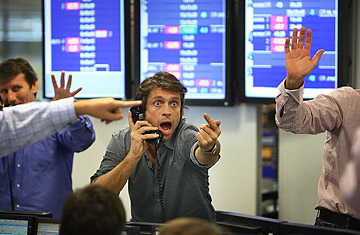
London traders with higher exposure to testosterone were found to be as much as six times more successful than their counterparts
Its days as a cozy, boozy gentlemen's club may have long passed, but the City, as London's financial quarter is known, remains a male bastion. As it turns out, that could have more to do with biology than misogyny. In a study by scientists from the University of Cambridge, male City traders who had been exposed to high levels of testosterone in the womb were on average six times more profitable than those exposed to low levels of the hormone.
In the research, to be published Jan. 13 in Proceedings of the National Academy of Sciences, a U.S. journal, scientists measured 44 male traders' second-to-fourth-digit-length ratio, which is otherwise known as 2D:4D and is an indicator of the effects of prenatal testosterone. The longer a trader's fourth finger relative to his index finger, and therefore the lower the 2D:4D ratio, the greater his prenatal exposure to the hormone. All of those taking part in the study carried out the same type of trading over the 20-month period studied and had the same access to cash and information, and none benefited from underlying client business. (See pictures of scared traders.)
Clearly, that a lower ratio pointed to higher profits speaks to a little more than finger length. Earlier studies indicated that prenatal exposure to testosterone, which spikes between the 9th and 18th weeks of gestation, increases a person's sensitivity to the effects of the hormone much later in life. The greater the exposure as a fetus, in other words, the higher the levels of confidence, vigilance or risk appetite triggered by testosterone in an adult. That observation has already made digit ratio a useful indicator of ability in fields other than finance; 2D:4D has been found to predict success in sports such as soccer, basketball and skiing, for instance. (Read TIME's top 10 sports moments of 2008.)
Now the same can be said about the competitive, quick-fire business of "high-frequency" trading — in which traders often hold positions for just a few seconds at a time. That's not overly surprising. In a separate Cambridge study last April, traders with high morning testosterone levels recorded higher profits for the rest of that day than they did on days when their circulating testosterone level was low. Building on those findings, the newer study suggests that the lower those traders' 2D:4D ratios, the bigger their swing in profits between the high- and low-testosterone days.
So do men make better traders than women? Not exactly. Though it helped determine the male subjects' returns, the 2D:4D ratio accounts for only 20% of the difference in profit levels observed in the study, according to John Coates, a Wall Street trader turned Cambridge scientist and the study's lead author. "Which means there's 80% left unexplained. It's like height in tennis. It appears to give you some sort of advantage, but there's probably a dozen other things giving you an advantage, and if you were to focus just on [height], you'd be missing all sorts of great players like Jimmy Connors," Coates says. "You need speed, you need agility, you need insight, you need intelligence — it's the same thing in trading."
Moreover, what constitutes an edge in one form of trading could be deemed a drawback in another. Those more sensitive to changes in testosterone levels may be less well suited to holding down long-term trading positions, for one thing. "The message here," says Coates, "is that biology can give you an edge, just as it does in sports or music, but it's not that there's one biological trait that determines success in the financial world. Those traits will change, depending on which segment of the market you're in."
The study's deeper implication, according to Coates, may be for economic principles. "Efficient-market theory harbors the assumption that if you're not rational ... you'll be driven out of business," he says. "It's clear that traders aren't rational. They can be. But whether they're rational or not really depends on how they interpret information. It depends on the amount of steroid in the system." For anyone trying to come to terms with the global economic slowdown and the financial-market ruin that caused it, that ought to be little comfort.
See pictures of the financial crisis in London.
Read a TIME story about high testosterone meaning high profits.
